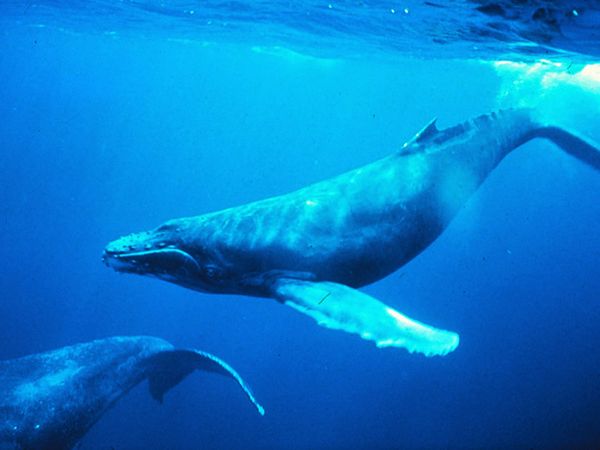 New research shows that the legendary songs of humpback whales evolve rapidly as they’re spread throughout the world’s population by traveling males whose new songs are adopted by listeners along their migration routes.
New research shows that the legendary songs of humpback whales evolve rapidly as they’re spread throughout the world’s population by traveling males whose new songs are adopted by listeners along their migration routes.
Male humpbacks have a highly stereotyped, repetitive, song that functions in sexual selection, either through mate attraction or male “social sorting”. Males within a population generally conform to a single song type built on the same musical themes sung in the same order at any one time. The pattern of the song evolves, sometimes rapidly, within a population from year to year, but all of the males within a population conform to the current version of the song, and similarities often exist among the songs of populations within the same ocean.
The new paper, published in Current Biology, documents a striking pattern of horizontal transmission: multiple song types spread rapidly and repeatedly in the same direction, like cultural “ripples”, eastward through the populations of the South Pacific over an 11-year period. The work documents “revolutionary changes” in culture that were replicated in multiple humpback populations over a vast geographic region. As the authors note, “The level and rate of change is unparalleled in any other nonhuman animal and thus involves culturally driven change at a vast scale.”
 From the BBC summary:
From the BBC summary:
Using sound analysis software, Ms Garland and her colleagues discovered that four new songs that had emerged in a population in Eastern Australia gradually spread eastwards. Within two years of this new song being invented, whales in French Polynesia were singing this same “version”.
Peter Tyack, a biologist from Woods Hole Oceanographic Institution in Massachusetts, US, said the results showed “a new way to look at culture in these animals”. “These are very mobile animals; they can swim hundreds of kilometres in a day… and their song carried very well underwater,” he said. “So all it takes is a few roving males acting as cultural ambassadors to spread their songs [from population to population].”
Listen to one of the songs the researchers recorded here. And a video of singing humpacks:
[youtube]http://www.youtube.com/watch?v=WabT1L-nN-E[/youtube]
Original source: Ellen C. Garland, Anne W. Goldizen, Melinda L. Rekdahl, Rochelle Constantine, Claire Garrigue, Nan Daeschler Hauser, M. Michael Poole, Jooke Robbins, Michael J. Noad. 2011. Dynamic Horizontal Cultural Transmission of Humpback Whale Song at the Ocean Basin Scale. Current Biology, In Press, Corrected Proof, Available online 14 April 2011.
Leave a Reply